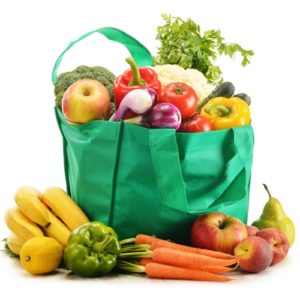As a culinary student, you are constantly working on innovative recipes inside and outside the classroom. This can require many trips to and from the grocery store. Ingredient shopping may be changing, however, as cities like San Francisco, Seattle and Austin, Texas, are banning one-use plastic shopping bags. This is an attempt to reduce waste and litter while promoting better environmental practices. Even if this ordinance has not reached your city, you can do your part by using reusable grocery bags.
It’s a simple way to help the planet and can make our lives easier. Plastic bags are generally used once and then thrown away, which is a waste. They then blow all over landscape and fill up landfills, posing a threat to wildlife. Making the switch to reusable grocery bags is simple. Here’s is what you need to know about your options to pick the right one for you:
Material
Cotton: This is a great option for a grocery bag because of its durability. In addition, it can be easily cleaned by being thrown in the washing machine. Organic cottons are better for the environment but can be pricier than natural-fiber cotton. Recycled cotton is also an option that is made of post-industrial recycled/reclaimed cotton.
Laminated: Laminated bags are made from laminated woven polypropylene, laminated nonwoven polypropylene or laminated recycled PET. They can be easily cleaned by spraying or wiping down. Some have a matte finish while others are more glossy.
Polyester or synthetic: These are the most common recyclable bag materials. They are derived from natural gas or oil, though they are not biodegradable.
Style
Reusable shopping bags come in all different shapes and sizes that can cater to your lifestyle. If you live in an urban environment where you don’t own a car and primarily take public transportation, opt for a reusable cart with wheels that you can easily transport. Bags that have flat bottoms and can stand themselves up are perfect to sit upright in a car. Some bags are bigger and some can fold up so you can stash them in your purse or pocket.
Handle lengths also vary. If the handle is long, you can carry it over your shoulder while the shorter handles can be carried like traditional grocery bags. Be to sure to choose whatever is convenient for you and your lifestyle.
Tips and tricks
Transitioning from using paper and plastic bags to reusable ones isn’t always an easy one. Here are some tips to make the transition flow more smoothly.
- Keep the bags in your car, not your house. If you keep the bags in your house, odds are that you will forget about them. Put them in your car so even if you forget to bring them in the store, you can run outside. If you don’t have a car try placing them somewhere obvious in your house.
- Make sure to buy enough bags. Grocery trips can range from prepping for an entire party to only grabbing one thing. Be prepared for either.
- Wash them regularly. Bacteria can build up after a few uses, so try washing bags every other week.




